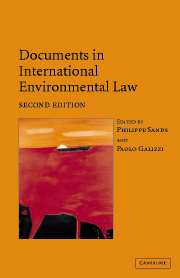Book contents
- Frontmatter
- Contents
- Preface
- PART I General instruments
- PART II Atmosphere
- PART III Oceans: global
- 8 London Convention on the Prevention of Marine Pollution by Dumping of Wastes and Other Matter, 29 December 1972
- 8A Protocol to the Convention on the Prevention of Marine Pollution by Dumping of Wastes and Other Matter, 7 November 1996
- 9 International Convention for the Prevention of Pollution from Ships, 2 November 1973
- 9A Protocol of 1978 Relating to the International Convention for the Prevention of Pollution from Ships 1973, 17 February 1978
- 10 United Nations Convention on the Law of the Sea, 10 December 1982 (extracts)
- 11 Agreement for the Implementation of the Provisions of UNCLOS Relating to the Conservation and Management of Straddling Fish Stocks and Highly Migratory Fish Stocks, 4 December 1995
- PART IIIB Oceans: regional
- PART IV Freshwater resources
- PART V Biodiversity
- PART VIA Hazardous substances and activities: nuclear
- PART VIB Hazardous substances and activities: pesticides
- PART VIC Hazardous substances and activities: waste
- PART VII Human rights and the environment
- PART VIII War and the environment
- PART IX Trade and the environment
- PART X Environmental impact assessment and access to information
- PART XI Liability for environmental damage and breaches of environmental obligations
- PART XII The Antarctic
8 - London Convention on the Prevention of Marine Pollution by Dumping of Wastes and Other Matter, 29 December 1972
Published online by Cambridge University Press: 05 June 2012
- Frontmatter
- Contents
- Preface
- PART I General instruments
- PART II Atmosphere
- PART III Oceans: global
- 8 London Convention on the Prevention of Marine Pollution by Dumping of Wastes and Other Matter, 29 December 1972
- 8A Protocol to the Convention on the Prevention of Marine Pollution by Dumping of Wastes and Other Matter, 7 November 1996
- 9 International Convention for the Prevention of Pollution from Ships, 2 November 1973
- 9A Protocol of 1978 Relating to the International Convention for the Prevention of Pollution from Ships 1973, 17 February 1978
- 10 United Nations Convention on the Law of the Sea, 10 December 1982 (extracts)
- 11 Agreement for the Implementation of the Provisions of UNCLOS Relating to the Conservation and Management of Straddling Fish Stocks and Highly Migratory Fish Stocks, 4 December 1995
- PART IIIB Oceans: regional
- PART IV Freshwater resources
- PART V Biodiversity
- PART VIA Hazardous substances and activities: nuclear
- PART VIB Hazardous substances and activities: pesticides
- PART VIC Hazardous substances and activities: waste
- PART VII Human rights and the environment
- PART VIII War and the environment
- PART IX Trade and the environment
- PART X Environmental impact assessment and access to information
- PART XI Liability for environmental damage and breaches of environmental obligations
- PART XII The Antarctic
Summary
Editorial note
The London Convention on the Prevention of Marine Pollution by Dumping of Wastes and Other Matter prohibits the dumping of ‘wastes and other matter’ listed in Annex I, requires a specific permit to be granted for dumping ‘wastes and other matter’ listed in Annex II, and requires a general permit to be granted for dumping ‘wastes and other matter’ listed in Annex III (Article IV(1)). ‘Wastes and other matter’ is defined broadly as any type of material or substance (Article III(4)). The rules do not restrict a Party from prohibiting dumping of any matter not included in Annex I (Article IV(3)). Permits are subject to grants by national authorities in respect of all matter intended to be dumped that is loaded in a Party's territory and, if loaded in the territory of a non-Party, in respect of vessels flying its flag (Article VI). Parties are required to take measures to prevent and punish breaches of the Convention (Article VII). Parties also undertake to develop rules governing liability and dispute settlement (Article X). Exceptions to the Convention's obligations are permitted for dumping in cases of extreme risk to human life, ships or aircraft and where no alternative to dumping is apparent (Article V). In addition, the Convention does not apply to disposal of material in the normal operation of aircrafts, ships or other man-made structures or to materials disposed of in the course of exploiting the sea-bed resources (Articles III(1)(b) and III(1)(c)).
- Type
- Chapter
- Information
- Documents in International Environmental Law , pp. 237 - 251Publisher: Cambridge University PressPrint publication year: 2004
- 1
- Cited by



